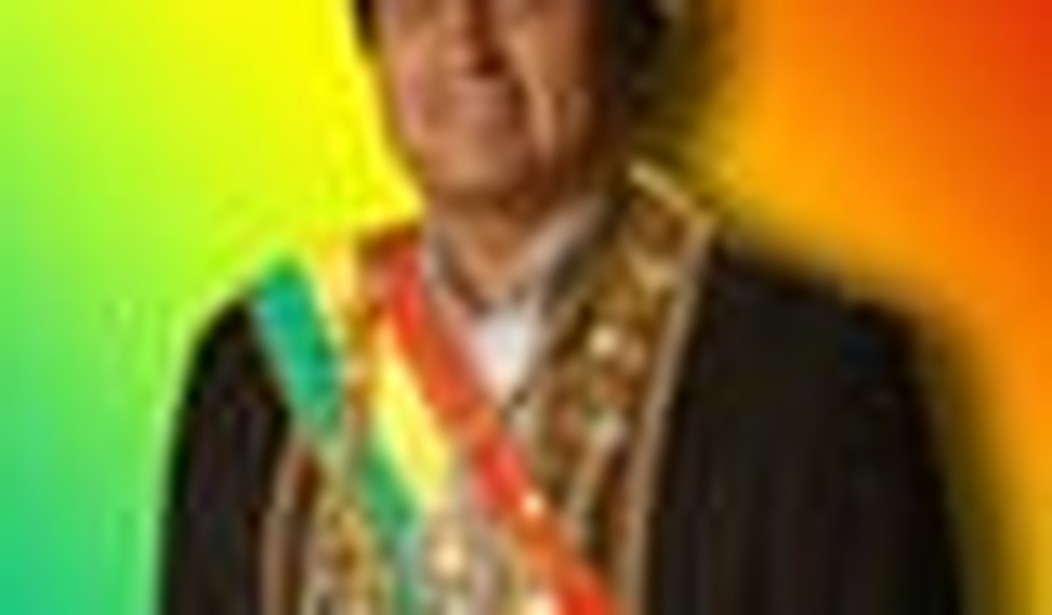Things continue to get worse for Bolivian president Evo Morales. Last December, his country erupted in massive street protests when Morales abolished fuel subsidies and thereby caused an abrupt spike in gasoline and diesel prices. Chastened by the violent backlash, he quickly reversed his decision and restored the subsidies. A few weeks ago, fresh anti-government protests began. Spearheaded by the most powerful Bolivian trade union (the Central Obrera Boliviana), the demonstrations were aimed at winning a 15 percent salary increase for teachers, miners, policemen, and other public-sector workers. Morales had proposed a 10 percent pay hike, but only for certain employees. The unions wanted more, and they launched a general strike to secure their demands. Labor activists set off dynamite and clashed with riot police, who used tear gas and water cannons to repel the unruly mobs. On Monday, the unions agreed to end their strike and accept a broad-based 12 percent pay increase. Meanwhile, the government appeared to backtrack from its declared plan to nationalize various mines owned by Pan American Silver and Glencore International, citing union opposition.
For the time being, Morales has quelled the unrest. But the recent strike — along with the fuel protests in December — showed that the former coca grower has lost the support of many poor and working-class Bolivians, who helped him secure reelection with 64 percent of the vote in December 2009. The unions were once bastions of pro-Morales sentiment — in fact, Morales himself was a top union leader before entering politics — but they are now among his fiercest critics. Morales took office with bold promises of reducing widespread poverty and deep inequality. Instead, his policies have spooked foreign investors, spurred capital flight, slowly destroyed the vitally important Bolivian energy sector, and increased social polarization. As of January, his approval rating stood at just 36 percent, according to the Ipsos Institute. A more recent poll found that if Morales ran for reelection today, he would receive only 22 percent of the vote.
Bolivia’s decline reflects the utter and complete failure of Chávez-style economics. Morales is a prominent disciple of the Venezuelan dictator, and he has closely followed Hugo’s playbook. He has weakened the rule of law, undermined democracy, and nationalized a significant portion of the economy while seeking to implement an ambitious land-redistribution agenda. Bolivia has the second-largest natural-gas reserves in South America. Yet Morales nationalized the industry in 2006, with predictably negative consequences. Last summer, the president of the Bolivian Chamber of Hydrocarbons told the Financial Times that his country’s natural-gas reserves were shrinking “because there have not been any significant investments in the past five years.”
Indeed, through nationalization schemes, price controls, and other anti-business measures, Morales has chased away both domestic and foreign investors. As Bolivian economist Waldo López said last year, “The government has a foreign-investment phobia, and its nationalization processes and the lack of clear rules are creating lack of confidence.” The World Bank’s 2011 “Doing Business” survey ranks Bolivia 149 out of 183 economies, behind even Sierra Leone and Syria. It is the poorest nation in South America, and among the very poorest in the entire Western Hemisphere.
Yet in both his personal lifestyle and his public spending, Morales has behaved as if his country were much richer. In 2010, for example, he bought a $39 million presidential plane and agreed to purchase a $300 million Chinese satellite. Not surprisingly, corruption is rampant in his government. In February, a Morales intelligence adviser named René Sanabria, who had previously served as Bolivian drug czar, was arrested in Panama on drug-trafficking charges. Sanabria allegedly orchestrated a 317-pound cocaine shipment last November. His arrest was a huge embarrassment for Morales, whose administration has been rocked by numerous high-profile scandals.
Bolivia desperately needs a unifying leader who can bridge its many ethnic, geographic, and economic divides. It has long been a fractured society. Indeed, it is really two societies, one consisting of poor indigenous Bolivians, who are concentrated in the western highlands, the other made up of mixed-race mestizos and whites, who dominate the eastern lowlands. While eastern Bolivia is the more prosperous region, most Bolivians live in the west, and a majority of the population is indigenous.
Morales is the country’s first indigenous president. When he was elected in 2005, the Chávez acolyte boasted fairly broad support across different racial and economic groups. Yet he has pursued discriminatory and exclusionary policies designed to benefit Bolivia’s Indians at the expense of its mestizos and whites. He has also weakened Bolivia’s democratic institutions and attempted to reduce both the political and economic power of its wealthy eastern states. As a result, Bolivia today is far more divided and polarized than it was when Morales took office.
The United States has more than a passing interest in Bolivia’s future. After all, the country is a major cocaine producer. Morales expelled the Drug Enforcement Administration from his country back in 2008, and a new U.S. government report says that Bolivia has “failed demonstrably” to combat drug trafficking and meet its international obligations. It has also strengthened relations with the Iranian theocracy. According to the Associated Press, a 2009 Israeli foreign ministry document accused Bolivia (and Venezuela) of providing Tehran with uranium.
As public support for Morales continues to erode, the democratic opposition has a golden opportunity to unify around shared principles and position itself to reclaim power in the next election. That would be immensely good for both Bolivia and the cause of democracy in the Americas.









Join the conversation as a VIP Member